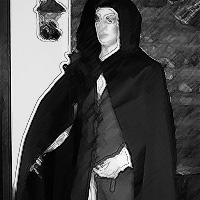Vogue rogue
From Twilight Heroes Wiki

|
| vogue rogue |
|---|
You are fighting a vogue rogue.
This rogue strives to be as stylishly modern as possible while imitating an ancient lifestyle. With that kind of internal conflict it's no wonder she's turned to crime.
Your opponent attacks ...
Hit messages:
- The rogue whips out a belt and lashes you with it. What really hurts is the onion tied to the end. Apparently that's the style these days.
- She riddles you with arrows. "Man?" you guess. "No, wait, the letter 'e'?" But by then it's too late.
- The rogue performs a Madonna-esque dance. It's a stylish tango ... of pain and suffering.
She hits you for X damage.
Critical hit message:
Your opponent has a critical hit! She hits you for X damage.
Miss messages:
- The rogue aims, but the hood of her fancy cloak slips down over her eyes and she can't see to aim.
- The vogue rogue charges you. Thinking quickly, you pull out a hair iron and crimp her style.
- She slings arrows at you, but outrageous fortune allows you to dodge them all.
Fumble messages:
Your foe fumbles! She takes X damage.
Victory! You beat up your foe and win the combat!
You gain 52 experience.
You got an item: bow of hazard ![]() (15.5 ± 2.7%)
(15.5 ± 2.7%)
You got an item: hooded cloak ![]() (19.2 ± 2.9%)
(19.2 ± 2.9%)
You got an item: lover's locket, left half ![]() (10.9 ± 2.3%)
(10.9 ± 2.3%)
Known resistances/weaknesses
50% resistant to ice damage.
100% weak to fire damage.
Locations
References
- The second hit message references well known riddles. The first is the Sphinx's riddle: "Which creature in the morning goes on four legs, at mid-day on two, and in the evening upon three, and the more legs it has, the weaker it be?" The second is: "The beginning of eternity The end of time and space The beginning of every end, And the end of every place."
- The third hit message references Madonna's hit single Vogue, as does the name of the foe.
- The third miss message references the famous to be, or not to be soliloquy spoken by Hamlet.
- The first hit message references a rambling story by Abe Simpson in The Simpsons.